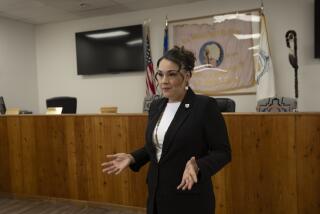States Don’t Like These Lottery Numbers : Gaming: Governments, fearing huge losses to their treasuries, ask phone firms not to carry the National Indian Lottery’s calls.
WASHINGTON — Several states seeking to protect millions of dollars in gambling revenue want to pull the plug on a nationwide Indian-run lottery, and they’re pressuring phone companies not to carry calls to the lottery’s 800 number.
The National Indian Lottery was announced last month by the Coeur d’Alene tribe of Idaho and is set to start this fall. Leaders of the 1,300-member tribe said the game will be offered in the 36 states that have lotteries and in the District of Columbia. Tickets would be sold by phone or mail.
The states say the lottery is illegal under state and federal laws.
AT&T; has told the attorneys general of Connecticut and Minnesota that it will not provide a toll-free phone network for the lottery. Florida and Rhode Island asked long-distance companies not to serve the lottery. The four states all have their own lotteries.
AT&T; and MCI have been negotiating with the tribe to provide the 800 service.
“We agree that there are some questions about the legality of this. . . . I presume we would work with any attorney general who asked us not to provide service,” AT&T; spokesman Mike Lordi said Tuesday.
MCI had no immediate comment.
In a letter to the tribe last week, Sprint said it was “not interested in providing service” for the lottery.
“We’re not going to blink. We’re not going to go away,” said David Matheson, general manager of the tribe’s gambling operations. “We think for the most part the phone companies are going to hang in with us.”
Spokesmen for AT&T; and Sprint said they could not block calls from reaching the lottery if another carrier is providing the 800 network.
Matheson accused the states of “economic racism,” arguing that states do not stop residents from using the phone to gamble in foreign countries’ lotteries or at U.S. off-track betting operations.
The tribe has offered to share some of the proceeds with all 50 states and with Indian tribes that do not have gambling operations.
State officials contend the lottery would break state laws against betting with credit cards and telephones and violate a federal law against interstate transmission of gambling information.
Under federal law, phone companies must stop their facilities from being used for transmitting or receiving gambling information as soon as they are notified by law enforcement officials.
The National Assn. of Attorneys General recently passed a resolution declaring the lottery illegal and urging the Justice Department and National Indian Gaming Commission to block it. The tribe says it is exempt from state gambling laws because the lottery will be operated from facilities on the Coeur d’Alene reservation. State law enforcement officials say their laws apply because the calls would be made from their states.
More to Read
Sign up for Essential California
The most important California stories and recommendations in your inbox every morning.
You may occasionally receive promotional content from the Los Angeles Times.










